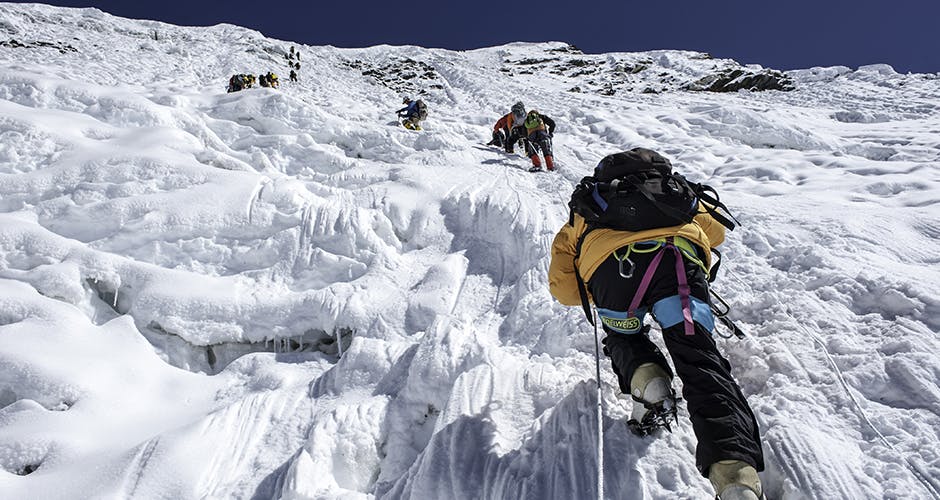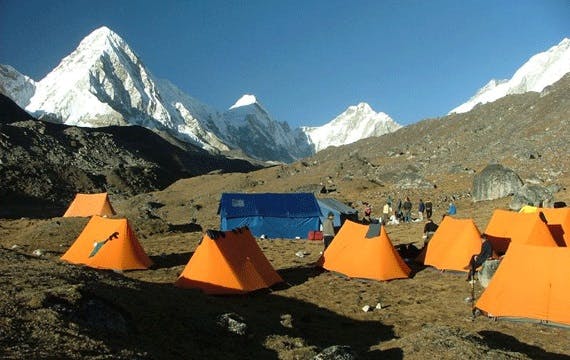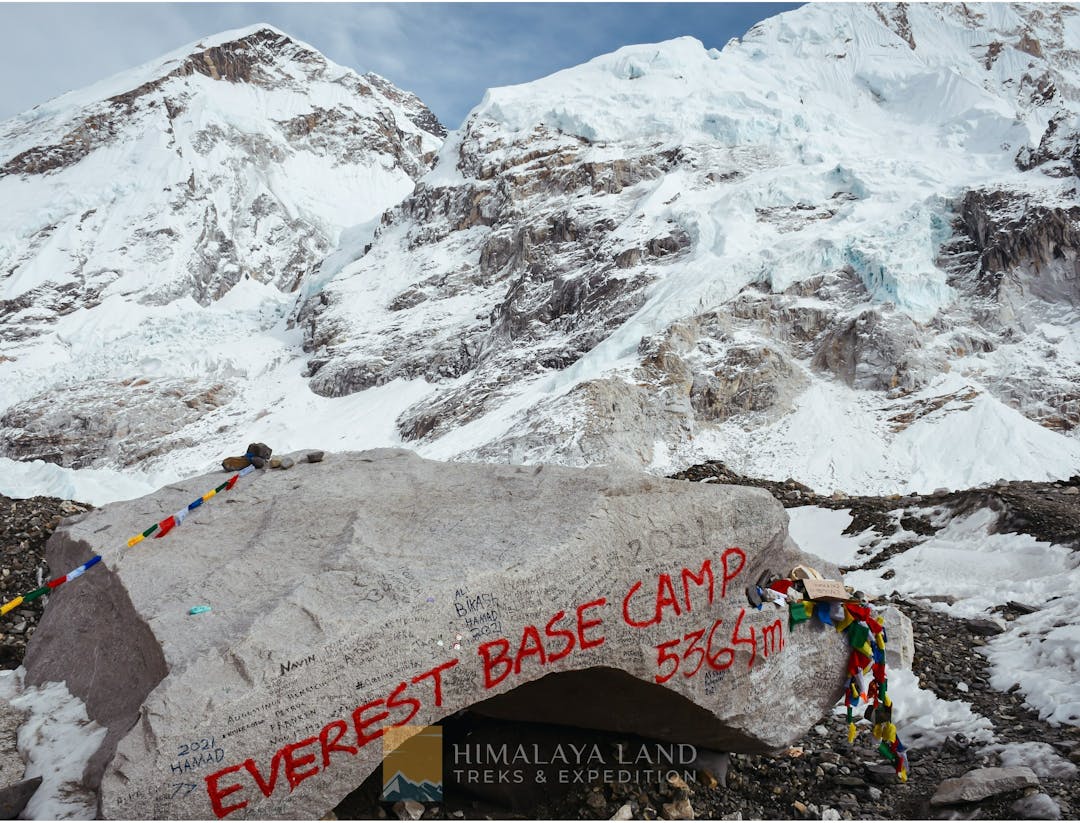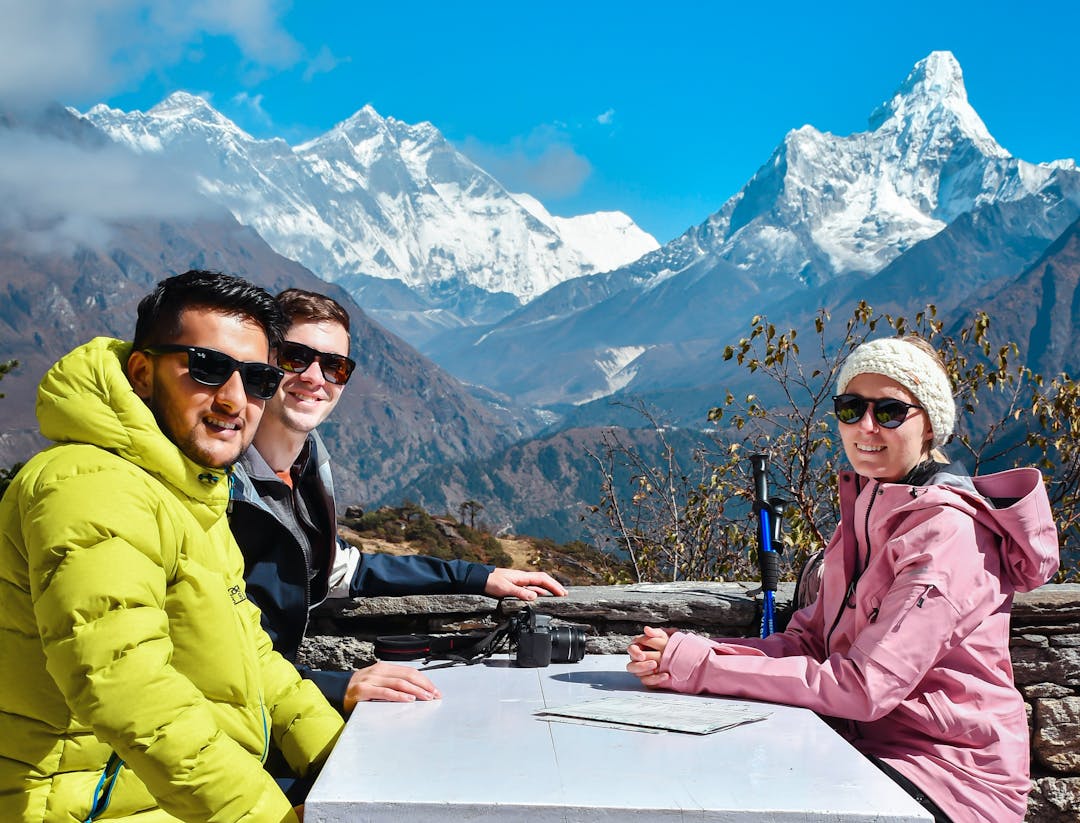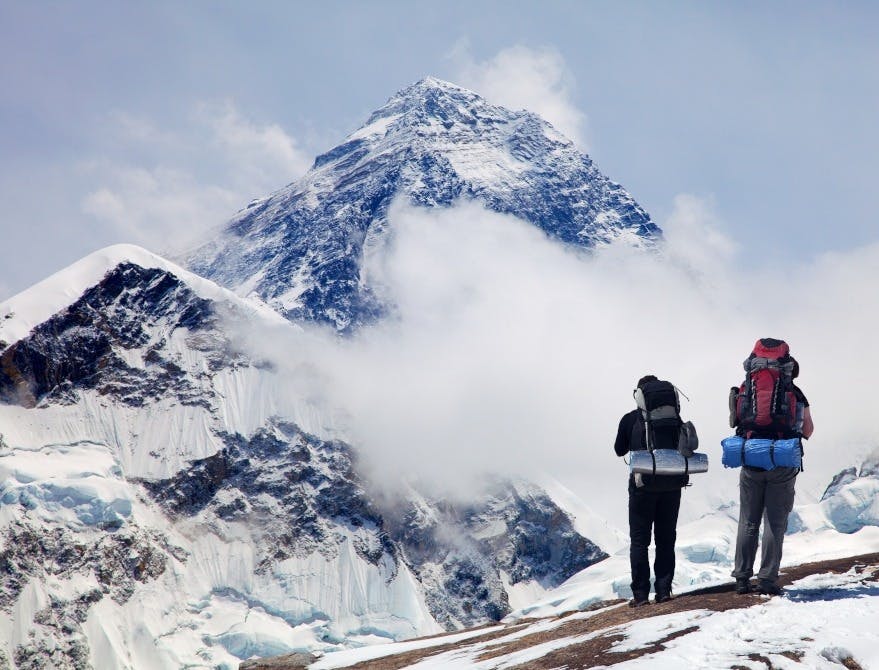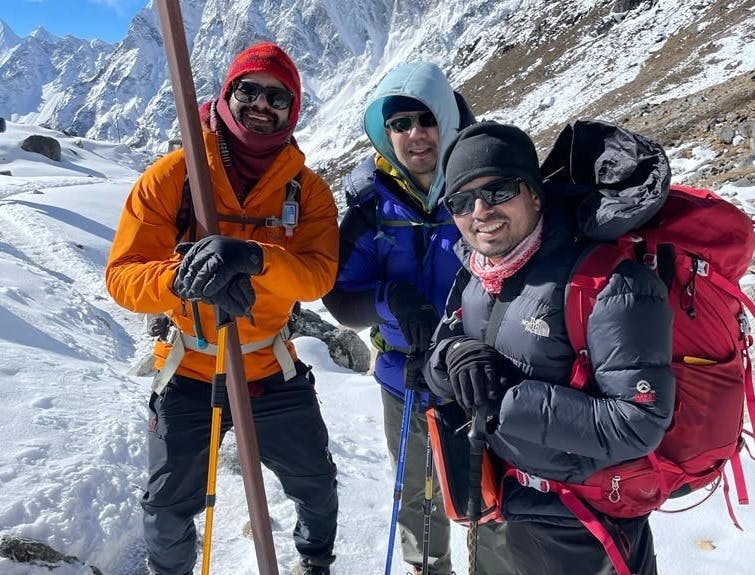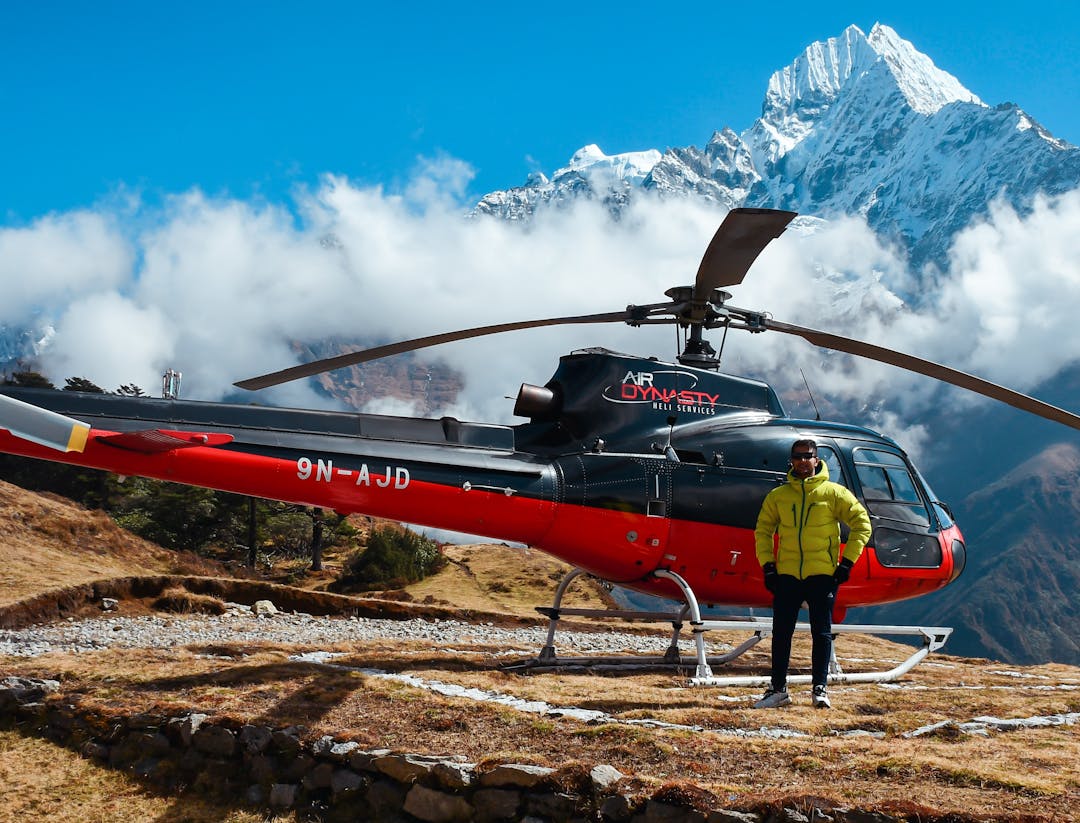Are you planning on trekking to Everest Base Camp with the added challenge of summiting Island Peak? It's an exciting adventure, but there are some important things you need to know before you go. In this article, we'll discuss the essentials of the Everest Base Camp and Island Peak trek, including what to expect, what to pack, and how to prepare.
EBC with Island Peak climbing Cost for 2024-2025
If you're an adventure enthusiast looking to experience the ultimate thrill of trekking to Everest Base Camp while also scaling the iconic Island Peak, then you've come to the right place. Himalaya Land Treks, one of the most trusted trekking agencies in Nepal, offers a comprehensive EBC trek with Island Peak climbing package at an unbeatable price.
The cost of the package depends on the size of your group, with the price per person decreasing as the group size increases. For a solo trekker, the cost is USD 2895. However, if you're traveling with a group of 2-4 people, the price drops to USD 2450 per person. For groups of 5-8 people, the cost per person further reduces to USD 2250. And for larger groups of nine or more, the price per person is a mere USD 1950.
This all-inclusive package covers all the necessary permits, accommodations, meals, transportation, and experienced guides. You will also be provided with a porter to carry your luggage during the trek. The Island Peak climbing permit and all the necessary equipment for climbing, including ropes, ice-axes, and crampons, are also included in the package.
if you're looking for an unforgettable adventure that combines trekking to Everest Base Camp with Island Peak climbing, Himalaya Land Treks is the perfect choice for you. With our unbeatable price, experienced guides, and exceptional services, you're guaranteed to have an unforgettable experience.
What is the best time for Everest base camp with Island Peak?
If you're planning to take on the thrilling challenge of the Everest Base Camp with Island Peak trek, it's important to choose the right time of year for your journey. The best seasons for this trek are spring (March-May) and autumn (September-December) due to favorable weather conditions that make the trek more enjoyable.
During these seasons, the trails are dry and the skies are clear, providing excellent visibility of the stunning mountain scenery. You'll have the opportunity to experience the majestic Himalayas at their finest, with panoramic views of snow-capped peaks, glaciers, and beautiful valleys.
However, it's important to keep in mind that the weather in the Himalayas can be unpredictable at times. Flight cancellations or delays to and from Lukla are not uncommon, so it's wise to allow for a day or two of buffer time in your itinerary to accommodate any unforeseen events.
By planning your Everest Base Camp with Island Peak trek during the spring or autumn season and allowing for potential delays, you'll have the best chance of experiencing the trek to its fullest potential. So pack your bags, lace up your boots, and get ready for an unforgettable adventure in the stunning Himalayas.
EBC with Island Peak Difficulty
Are you an adventure seeker looking to conquer the Island Peak climb in the Himalayas? Himalaya Land Treks can help you prepare for the challenges that lie ahead. The climb begins at Everest Base Camp (EBC) which is located at 5,364 meters above sea level. EBC requires a moderate level of physical fitness to reach, but once you acclimate to the altitude, you'll be ready to take on Island Peak.
At 6,189 meters, this climb requires technical mountaineering skills and experience. The expert guides at Himalaya Land Treks offer a variety of packages that include everything from transportation to gear rental, as well as advice on training, nutrition, and altitude sickness prevention. With breathtaking views of Lhotse and Makalu, summiting Island Peak will be a once-in-a-lifetime accomplishment. Contact Himalaya Land Treks today to start planning your adventure.
Physical fitness
If you're planning to embark on an adventure of a lifetime with an Everest Base Camp Trek and Island Peak Climbing, it's essential to be in top physical shape. The trek involves trekking at high altitudes for long hours, steep climbs, and inclement weather, so you must be prepared.
To start with, you can begin with cardio exercises such as running, cycling, or swimming to increase your lung capacity and endurance. Strength training exercises such as squats, lunges, and deadlifts will help build muscle strength and endurance, which is crucial for trekking on uneven terrain and carrying a backpack.
Aside from physical fitness, acclimatization is also an essential aspect of high-altitude trekking. Your body needs time to adjust to the thin air and low oxygen levels, so it's best to gradually ascend and acclimatize at each level before moving higher. Drinking plenty of water, eating a balanced diet, and getting enough rest are crucial for acclimatization.
In addition to physical fitness, it's crucial to pack appropriate clothing and gear for the trek. You'll need sturdy hiking boots, warm clothing, rain gear, a sleeping bag, a backpack, and a water bottle. You may also need other specialized gear such as crampons, ice axes, and helmets for Island Peak Climbing.
In conclusion, undertaking an Everest Base Camp Trek and Island Peak Climbing requires good physical fitness, acclimatization, appropriate gear, and proper planning. With the right preparation and training, you'll be able to enjoy this once-in-a-lifetime experience and make unforgettable memories.
Alternate Routes
If you are interested in exploring alternative trekking routes to the Everest Base Camp (EBC) while also considering Island Peak climbing, Himalaya Land Treks can offer you a diverse range of packages to choose from.
If you're looking for a more challenging and adventurous route, you may want to consider our Mt. Lobuche East Peak Climbing and Mt. Nirekha Peak Climbing, which will provide you with a unique experience and a different perspective of the Everest region.
If you're only interested in Island Peak climbing, our 16-day package is tailored to meet your needs. We offer both fixed and private trips at an affordable price. Our Sherpa leaders have extensive experience and have led countless trips to Island Peak.
Permits and paperwork
To trek to the Everest Base Camp with Island Peak climbing, you need a TIMS card, a Sagarmatha National Park permit, a Khumbu Rural Municipality permit, and an Island Peak climbing permit. Himalaya Land Treks can help obtain these necessary permits and paperwork. The TIMS card is mandatory for all trekkers in Nepal, while the Sagarmatha National Park permit and Khumbu Rural Municipality permit are required for the Everest region. The Island Peak climbing permit is necessary for climbers who plan to ascend Island Peak. We can Ensure that you have all the required documents before embarking on your journey to the Himalayas.
Equipment and gear
Himalaya Land provides harness, helmet, crampons, carabiners, and other gear for an Everest Base Camp Trek with Island Peak Climbing. But, you'll still need to bring good-quality trekking shoes, warm clothing, a reliable sleeping bag, a sturdy backpack, trekking poles, a headlamp, a water bottle, and a first aid kit. Pack light and prioritize safety and comfort. Trekking shoes with good grip and ankle support are crucial, and warm clothing in layers is a must. A sleeping bag rated for cold weather is essential, and a backpack with a capacity of at least 50 liters is necessary. With proper preparation and planning, you can have an unforgettable adventure in the Himalayas.
Altitude sickness
Altitude sickness is a serious concern when trekking to high altitudes such as Everest Base Camp and Island Peak. Proper acclimatization is crucial to avoid altitude sickness. This includes taking rest days and drinking plenty of water to stay hydrated. If you experience symptoms of altitude sickness, such as headaches, nausea, or dizziness, descend to a lower altitude immediately. Ignoring the symptoms can lead to severe health issues and even be life-threatening. It's also important to listen to your body and not push yourself too hard. Take breaks as needed, and don't be afraid to ask for help if you need it. With proper acclimatization and caution, you can safely enjoy the stunning views and challenges of the trek.
Weather conditions
Weather conditions in the Everest region can be extremely unpredictable and change rapidly. It's crucial to be prepared for all weather conditions, including snow, rain, and strong winds. Checking the weather forecast regularly is important, and you should be prepared to alter your plans accordingly. If the weather turns bad, it's important to have a plan in place for shelter or a safe place to wait out the storm. Bring appropriate gear, such as waterproof clothing, and make sure your gear is in good condition. Additionally, be aware of the signs of hypothermia and take appropriate action if necessary. With proper preparation and awareness of weather conditions, you can stay safe and enjoy your trek in the Everest region.
Cultural norms
The Sherpa people of the Everest region have a rich culture and unique way of life. It's important to respect their customs and traditions when trekking through their communities. Dressing modestly and appropriately is essential to show respect for their beliefs. You should also ask for permission before taking photos of people or their homes. Learning a few words of Nepali, the local language, is also an excellent way to show your appreciation for their hospitality. It's also important to be mindful of your behavior and to not act in a way that is offensive to the local community. By respecting their culture and way of life, you can have a meaningful and enriching experience while trekking in the Everest region.
In conclusion, trekking to Everest Base Camp and summiting Island Peak is an unforgettable adventure. But, it's important to be prepared and informed before embarking on this trek. With the right preparation, gear, and mindset, you can make this adventure a reality and have the trip of a lifetime.

